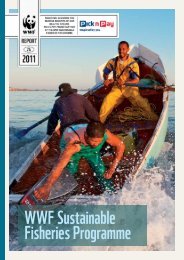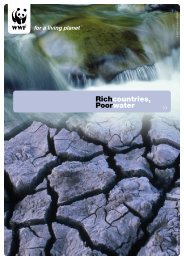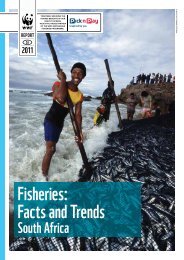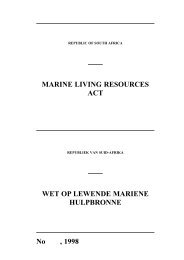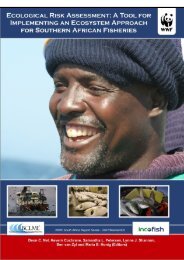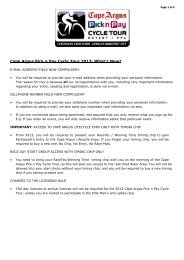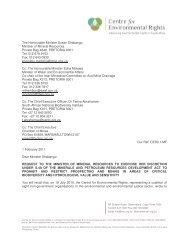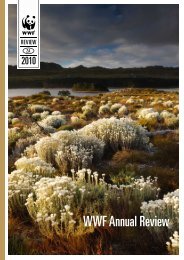State of Management of South Africaââ¬â¢s ... - WWF South Africa
State of Management of South Africaââ¬â¢s ... - WWF South Africa
State of Management of South Africaââ¬â¢s ... - WWF South Africa
- No tags were found...
Create successful ePaper yourself
Turn your PDF publications into a flip-book with our unique Google optimized e-Paper software.
STATE OF MANAGEMENT OF SOUTH AFRICA’S MARINE PROTECTED AREASIt is essential to consider that each location has unique social characteristics. Therefore, thediversity <strong>of</strong> coastal people and communities, especially in relation to their livelihoodstrategies, needs to be understood when planning and managing MPAs (Pomeroy et al.2006). This understanding can only come from effective, meaningful engagement with allaffected communities (IUCN 1994). Different strategies may need to be employed based onthe social characteristics in an area. Some areas may require the active involvement <strong>of</strong>stakeholders in all aspects <strong>of</strong> the MPA from planning to implementation and management,while for others a more passive level <strong>of</strong> participation may be appropriate (IUCN 1994). Asocio-economic assessment should be conducted prior to planning so to gain anunderstanding <strong>of</strong> the characteristics <strong>of</strong> the local communities, as well as the factors thatinfluence those communities. This understanding should facilitate effective participationprocedures during planning.Furthermore, it was indicated by several managers that plans lacked specificity with regard toprioritizing management issues encountered at the MPAs and that they did not provideadequate guidance for designing operational plans and allocating management resources.This suggested that the management approaches incorporated in the plan had not beensufficiently customized to the MPAs and the management capabilities. The extent to whichplans can be customized to an area is dependent on the availability <strong>of</strong> biological, social andgovernance information. Most MPA managers indicated that the information base for one ormore <strong>of</strong> these aspects was not fully adequate for planning purposes. Data bases, thatincorporate the results <strong>of</strong> monitoring and any research conducted in the MPA, should bedeveloped and maintained for each MPA and made available to planners.9.5 MANAGEMENT SYSTEMS9.5.1 InputA major deficiency highlighted in the 2003 assessment was the lack <strong>of</strong> a MPA specifictraining course and the poor level <strong>of</strong> understanding <strong>of</strong> MPA issues harbored by manypersonnel working in MPAs. This has been rectified to a degree by the development anddelivery <strong>of</strong> the MPA <strong>Management</strong> Training Course. Despite the fact that staff members didnot all participate in the course, it was reported that staff at many <strong>of</strong> the MPAs now had abasic level <strong>of</strong> understanding <strong>of</strong> MPA purpose, marine ecology and the relevant legislation.There was an indication that the knowledge gained by individuals in the course has beenshared in some instances, thereby benefiting the team as a whole.Working in the marine environment requires a specialized set <strong>of</strong> skills. Currently there is ashortage <strong>of</strong> staff with sufficient marine related skills. The most frequently identified skillsdeficiencies were those <strong>of</strong> skipper skills, seamanship and boat maintenance. There are nospecific courses that can develop these skills and most <strong>of</strong>ten they can only be acquired withexperience. It is recommended that exchange programmes or mentorship programmes beinitiated so to aid in the development <strong>of</strong> these skills. Other skills deficiencies that wereidentified included public relations skills, swimming, diving and data management.Pg 146






